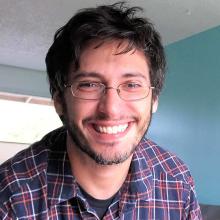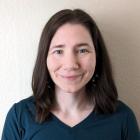COMPANY SPOTLIGHT: RIVERSTONE SUSTAINABILITY
NESEA's new BuildingEnergy Access program serves companies led by people historically underrepresented in the architecture, engineering, construction, and clean energy industries. This cohort-based program gives business leaders the opportunity to connect with the resources of NESEA's programs and community.
Each month, we'll meet a new member of the cohort. I recently had the opportunity to talk with Debra Shepard, owner of Riverstone Sustainability, to learn more about her background, company, and the beginning of the Access experience.
Ian Reed: So to begin, how many years have you been in business?
Debra Shepard: I founded Riverstone ten years ago, this Earth Day! It’s hard to believe! Ten years today!
Can you give us the short version of your company pitch?
Riverstone is a consulting firm based in Newburyport, Massachusetts, and we help organizations to measure, manage, and report their sustainability impacts. We were founded on the idea that leading organizations need a practical approach to move toward a more sustainable and innovative future. We do this through a combination of executive coaching, data analysis and disclosures, and programs developed hand-in-hand with an organization’s team to meet that organization’s unique needs, structure, and culture.
Our services include sustainability baseline assessments and plans, green building/LEED certification, carbon footprint analysis and net zero plans, utility rebate and grant support, ESG sustainability reporting, and contract sustainability officer services, among others.
What it boils down to is identifying the most important and relevant aspects of sustainability to manage, because not everybody knows what that means, and we don't all define sustainability the same way. Measuring those impacts and then coming up with key performance indicators and, borrowing from industry best practices, developing a plan so that it can be managed consistently for continuous improvement.
You mentioned recommending “a practical approach to move toward a more sustainable and innovative future.” Would you expand on that a little bit?
I am probably a little bit more conservative of a sustainability consultant than some others. I think that probably speaks to when I got my start; the economy crashed, money was tight, and it was a new field. People were just testing the waters and not ready to invest a lot in it. And most of my clients have a lean facilities staff, who want to do the right thing for the environment, but are stretched in terms of bandwidth. So everything that I do has to have a really strong business case. That's why I look for things like partnering with the utilities, getting rebates and grants and, and finding the easiest path to a payback. When you demonstrate that economic benefit, or how it connects with an organization's mission, you can really convince folks that it's the right thing to do. That's a key part of it.
I try to distill it down to specific actions that are digestible because some of my clients are just getting started with sustainability measures or they just don't have a lot of bandwidth to take on big changes all at once. So you have to start small and build it out. There is this creative tension because architecture firms are pushing really hard to set ambitious goals to address the climate crisis, rightfully so, but institutions who will own and operate the buildings want to make sure they trust the technology and can operate the buildings effectively. <laugh> So we have to meet in the middle a little bit.
 Can you tell us a little about your background and what led you to start your own business?
Can you tell us a little about your background and what led you to start your own business?
I had learned sustainability skills in grad school, working at MIT, and teaching a course on decarbonization planning at Harvard University Extension School, but at the time, there weren’t a lot of “in-house” sustainability positions. Consultants were the ones doing this innovative work with all different types of clients, and that drew me in. From my work at prior firms, I learned how to build a sustainability practice; what the service offerings would look like and what resonates with clients. Through my marketing efforts for those other firms, I was building my network and at the same time learning about the industry. I learned the ins and outs of running a consulting practice and felt like I was ready to take the reins. Working at larger firms, I sometimes ended up having to convince people internally that there was going to be a market, that this is a real thing, while at the same time that I was trying to land projects with clients.
It was super scary, but also really exciting, to think about going on my own and having more ownership over my work. I love working directly with clients to help them achieve their sustainability goals, so I was drawn to the idea of being able to decide who I worked with and how the work would be executed. I have had one university client since 2009, who actually followed me across two different consulting firms. I really loved working with them, so when I was deciding that I would go on my own, I called them up and asked “If I were to start my own firm, would you be interested in working with me?” And that's how Riverstone began.
I also wanted to have a better work life balance – at the time my husband and I were commuting daily to Boston and my 3 kids were all under the age of 8, so I was looking to have more control over my schedule so I could prioritize family time.
It sounds like your client relationships were the biggest driver for making the leap to running your own business.
Looking back over 10 years, it’s totally awesome that I am still working with that university client from 2009. I have several others going on five and seven years each. So I have some really long lasting relationships with my clients, which l love. I can really pour my heart into the projects for my clients so they get the best outcome and I'm not beholden to other competing commitments.
My focus is a hundred percent on making sure that they get what they need out of the process. I never realized how rewarding it would be until I was on my own. Suddenly, it's like, “this is mine”. And that’s horrifying, because if I fail, it's all on me. But when things go well, it feels amazing because I can be proud of the results. That's what keeps me going.
Have you been able to tackle larger projects because of the length of these relationships?
Yes, I think so. As each year goes by, the engagement gets deeper and the positive impact grows.
When I first started with my first university client in Boston, their president had signed onto a program called the Carbon Commitment. She handed it off to the facility director and said, “figure out how to do this.” <laugh> They brought me in through a prior firm to develop their first carbon footprint and conduct a gap analysis to determine what they were already doing around sustainability and where they could focus their efforts. What's going on with your building policies? Do you follow LEED? What are you doing for energy efficiency and recycling? What environmental issues are your students interested in? It covered a broad range of topics. That led me to run their Sustainability Committee and as is common with new initiatives, it was a volunteer-driven, grassroots initiative. Initially, we had a group of interested faculty, staff, and students who would offer ideas but the group did not have the authority to make sweeping changes. We started by tracking their campus sustainability performance (energy, water, waste, etc.) and developed their first Climate Action Plan. We opportunistically did things as we could. And for a while, that was as far as it could go.
In recent years, momentum has really picked up and it's amazing to see how far their sustainability program has come. We partnered with National Grid and Eversource seven years ago, to start intentionally working on energy efficiency in buildings. Now we meet with them every six weeks and through that partnership we have saved millions in kilowatt hours and hundreds of thousands of therms. We have a longlist of all the projects that we've pursued and are able to report out the energy and cost savings. Being able to say “you've earned over $2 million in rebates, and you're saving $2M per year on energy costs”, having that business case, has helped build the credibility of the program.
For the last few years I've gotten more involved in their green building projects as the sustainability point person. I am able to get into the details, influence the design and outcomes, and work with the client to plan for the future evolution of the campus, too. That's pretty significant. Now I can take the students on campus tours and say, “did you know that this material is made out of recycled glass?” I can physically point to the positive impacts that the projects have, which is really fun.
Recently, in the last two or three years, the City of Boston ratcheted up what they're doing in terms of decarbonization and sustainability policies. I started to get more involved in policy work at that time as I began listening into the stakeholder sessions and providing (anonymous) feedback on behalf of the universities that I worked with, to help the City understand how we approach carbon accounting and campus sustainability planning. It’s been really interesting to get involved in that work as it will have a greater impact across the region and also helps my clients align with the City’s shared goals for climate action.
You’re almost acting like a translator, in some ways, getting these institutions to speak to each other.
Yes, exactly. It’s important for the City to hear what's happening on the ground with implementing the new energy code in projects, and how it relates to the proposed zero net carbon zoning. They’ve been very receptive to our feedback, as again, we are all working toward the same goals. Meanwhile, we’ve been spending a fair bit of time working with project teams and building owners who are just trying to understand how the new code and policies work and what it means for their buildings and operations teams. I’ve gotten deeper and deeper into that kind of work.
 Where do you see yourself taking the company in the future?
Where do you see yourself taking the company in the future?
Over the last few years, really right after the pandemic began to subside, we’ve seen the interest and demand for sustainability and green building work really take off. So we're in a lucky position, where we haven't had to do much marketing. People are coming to us a lot looking to work together, which is fantastic. But in terms of the work/life balance it can be a challenge... <laugh>
<laugh> Fair enough, fair enough.
I am at the point where I want to bring a few more people on board. Not a huge team. I envision maybe three to six people. A little power team. It would be nice to bounce ideas off of another partner and then have a few junior consultants to really execute on more project work and develop their skills, so we can scale up and meet the demand, and most importantly to have a greater impact.
And then another ambition is to get Women-Owned Business Certified because it's been on my list for years, and clients are beginning to ask for this more and more as part of their supplier diversity initiatives. I really need to get it done!
That brings us to our final questions: what part of NESEA’s programming or community are you most excited to be involved in? What excited you about the BuildingEnergy Access program and made you want to participate?
Well, this might sound odd, but it was the idea of peer accountability. I am so busy doing the work, and interacting with the clients, which I could do all day long and just be completely absorbed in, but as a business owner, I have to start thinking about the scaling and the systems needed, and I felt like BuildingEnergy Access will help force that. Because there are set dates where we are going to meet, and all of the sudden you're in a room with all your peers asking, “have you done your homework?” I like that because it's keeping me on a milestone path to develop the business.
I've looked at women's business programs before, but what I do is so different. A lot of the programs around here are very customer oriented, like you're selling a product, or you're in retail, that kind of thing. That's so not what I do. <laugh>.
When I heard about this program, I said “oh my gosh, it's in the clean energy space and related to buildings. This is amazing.” There are many women in the industry, don't get me wrong. But there are still many times where I'm the only woman in the room working on client projects and I have to fight to have my voice heard. So, it's been really refreshing being in a group of my peers and I'm enjoying getting to know the other women.
Even though everybody comes from a different background, or perspective, and we're at different places with our businesses, we’ve found a lot of commonality. At the first workshop we were asked “What's your company’s biggest challenge right now?” And everyone said “Hiring, hiring, hiring, hiring.”
And I thought “How about that? Everybody has the same short list of challenges.” I think it's valuable to work on those common challenges together and to be able to speak very openly. Because as a business owner you're like, “Everything's great.” But when you're in the room with those folks, it becomes, “But really, how do I hire someone and find the right person that can actually do the work that I need?” So there's a lot of frank conversations and peer support that already has been really nice.
Oh, that's terrific. Recently you attended BuildingEnergy Boston as part of the BuildingEnergy Access program. Was that valuable for you?
It was, yeah. I went to BuildingEnergy Boston several years ago, but I hadn't been in a while. It was nice reconnecting with some folks that I hadn’t seen in a while. I guess with the covid pandemic, everybody kind of scattered. So I think we’re all reconnecting with people in person again.
There was a lot of impromptu information sharing, related to the regulations that we were talking about earlier. I would just bump into someone that I knew, and we’d strike up a conversation about some new developments with building energy and decarbonization policies, and instantly start sharing information and schedule follow up conversations while running to our next session.
That's an example of a very “BuildingEnergy Boston” exchange <laugh>. “Impromptu information sharing” is a great way of putting it.
Yes - so much good energy (bad pun) in the room, open exchanges of information, and great networking and meeting new folks as well.
Thank you. It was a pleasure talking with you.
Thanks.
Our Mission
NESEA advances sustainability practices in the built environment by cultivating a cross-disciplinary community where practitioners are encouraged to share, collaborate and learn.
Recent Posts
administratorBE Boston 21 RegistrantsBE Boston 22 RegistrantsBE Boston 23 RegistrantsBE Boston 24 RegistrantsBE NYC 19 RegistrantsBE NYC 20 RegistrantsBE NYC 21 RegistrantsBE NYC 22 RegistrantsBE NYC 23 RegistrantsBottom Lines - FacilitatorBottom Lines - Steering CommitteeBuildingEnergy 16 Full ConferenceBusiness Membercontent admincontent editorMember
administratorBE Boston 21 RegistrantsBE Boston 22 RegistrantsBE Boston 23 RegistrantsBE Boston 24 RegistrantsBE NYC 19 RegistrantsBE NYC 20 RegistrantsBE NYC 21 RegistrantsBE NYC 22 RegistrantsBE NYC 23 RegistrantsBottom Lines - FacilitatorBottom Lines - Steering CommitteeBuildingEnergy 16 Full ConferenceBusiness Membercontent admincontent editorMember
BE Boston 20 RegistrantsBE Boston 21 RegistrantsBE Boston 23 RegistrantsBE NYC 19 RegistrantsBE NYC 20 RegistrantsBE NYC 21 RegistrantsBE NYC 22 RegistrantsBE NYC 23 RegistrantsBoard MemberBusiness MemberMember





